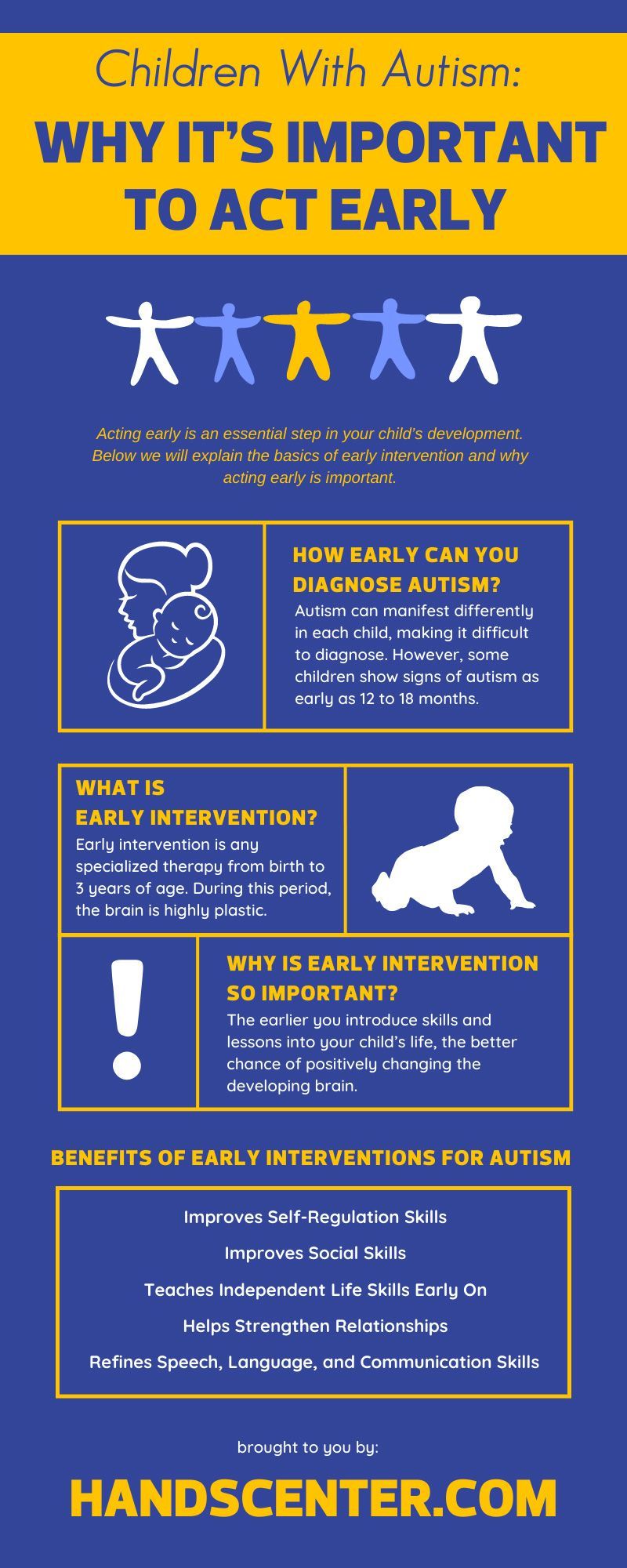Children With Autism: Why It’s Important To Act Early
Approximately 1 in 44 children have autism spectrum disorder, and by the time these children are 6, they will receive a diagnosis. If you’re a parent or caregiver of a child with autism, you know that early intervention is essential to steady growth, support, and fulfillment.
Often, many people are surprised at how early these ABA-based therapy sessions start and believe that children can’t handle early intervention therapy—but that’s far from the truth. Acting early is an essential step in your child’s development. Below we will explain the basics of early intervention and why acting early is important.
How Early Can You Diagnose Autism?
Autism can manifest differently in each child, making it difficult to diagnose. However, some children show signs of autism as early as 12 to 18 months. Children with autism typically show developmental differences in their social and communicative skills. This means that early signs often go unnoticed since they may develop some motor skills on time.
Some early signs of autism include:
· May not keep eye contact or makes little eye contact
· Not responding to their name being called by 9 months of age
· Not showing facial expressions, like happy, angry, or sad, by 9 months of age
· Gets upset at minor changes
· Doesn’t point to show you something interesting by 18 months of age
What Is Early Intervention?
Early intervention is any specialized therapy from birth to 3 years of age. During this period, the brain is highly plastic. This means that the brain can learn, comprehend, and develop new skills more easily, which will help the child as they grow older.
This is why many doctors and therapists urge parents to start ABA-based therapies right after the diagnosis. The earlier the treatment begins, the more likely your child will retain the information and have a better quality of life.
Examples of early intervention programs include:
· Speech and language therapy
· Family training
· Physical therapy
· Developmental evaluation
· Occupational therapy
Why Is Early Intervention So Important?
One of the most frequently asked questions about early intervention is, “Why is it important to act early?” The earlier you introduce skills and lessons into your child’s life, the better chance of positively changing the developing brain.
It’s ideal for children to receive individualized early intervention therapies to prevent developmental delays. This will prepare them for when they begin entering group learning environments. Early intervention also helps stop problematic behaviors from becoming habits.
What Does Your Child Do in Therapy?
One of the most important tasks a child needs to do is play. Playing has a major effect on a child’s developmental skills. While your child is performing ABA-based lessons, they play games or do fun educational activities.
Your child is likelier to engage and retain the information with a playful approach. The main priority is to create a positive experience for the child. This will be the foundation for their continued learning. At HANDS, we design our lessons around the child’s interests and tailor them to their level. This will ensure the child is successful and has the support they need.
During the early intervention and throughout your child’s education, parents and caregivers are strongly recommended to attend parent training for autism courses. These training courses will help you become the support your child needs at home. During these lessons, you will learn different ways to soothe your child, do ABA-based therapy at home, and use various activities to further support their developmental skills.
Benefits of Early Interventions for Autism
Autism doesn’t have a cure, but there are developmental therapies to help children with autism grow into independent adults. However, to achieve that, children with ASD will attend various interventions to develop and hone their skills. Early intervention is highly recommended for several reasons, including improving occupational skills and overall development.
Below are the benefits of enrolling your child into early intervention for autism programs.
Improves Self-Regulation Skills
Often, children with autism have sensory sensitivity, which can overwhelm them. In addition to that, they may have trouble with self-regulation. It may be difficult for them to understand a situation or communicate their feelings, leading to frustration.
With frustration and stress can come problematic behaviors like kicking, biting, hitting, or self-harming. Your child will learn safer and more appropriate coping methods during early intervention.
Improves Social Skills
One of the main developmental differences in children with ASD is social skill impairment. They may have trouble understanding others’ perspectives or engaging with their peers. By acting early, your child can improve social skills and be more interested in group activities.
Your child will learn to empathize and relate to others through early intervention and ABA therapies. This will allow them to develop meaningful friendships as they get older.
Teaches Independent Life Skills Early On
At HANDS, our main goal is to instill skills into our children so they can grow up to be independent. With early intervention, your child will work with occupational therapists to teach them how to perform daily tasks independently. These tasks include eating, self-care, writing, coloring, and other typical day-to-day activities.
We strongly urge parents to perform these strategies and skills at home and in other settings. This way, your child won’t only associate these activities with therapy. When you place how-to visuals around the house, your child can continue to practice and learn beyond the center-based setting.
Helps Strengthen Relationships
As you may know, children with autism process information differently, and they may react or say things in ways you’re not used to. It’s always best not to take things to heart and learn to understand your child. Understanding and connecting with your child is the best way to support them. This will help strengthen the parent-child bond and help your child build relationships with others.
Refines Speech, Language, and Communication Skills
Many children with ASD may face speech and communication delays. They have trouble verbally or nonverbally expressing themselves. During early intervention, our speech therapists will address these concerns and give your child the support they need. Your child will develop their communication skills through activities and games based on their evaluation.
In the end, we all want what’s best for our children. Finding the best ways to support your child and give them a great quality of life is a job well done. At HANDS, we strive to help your child achieve beyond their highest potential. We’re always looking forward to gaining a new learner! For more information, don’t hesitate to contact us.







